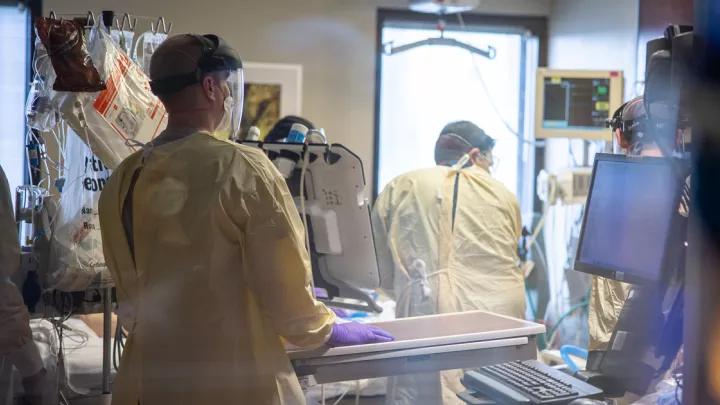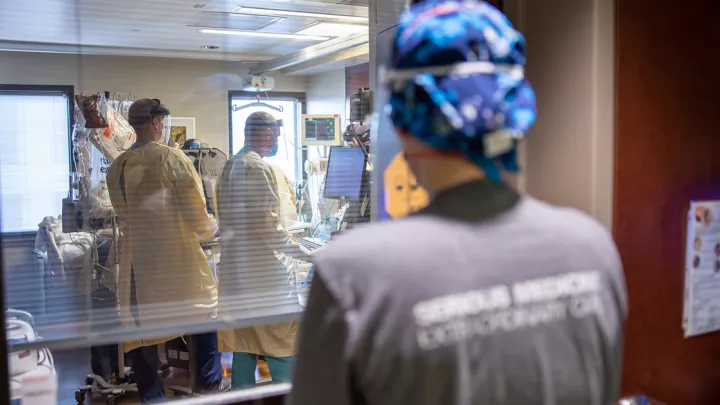Fear of needles? Don't let it affect your health

The thought of a needle stick is terrifying to some people. Those that struggle with a fear of needles may experience extreme fear, panic attacks, palpitations, fainting, nausea, sweating or insomnia leading up to the time of an expected needle stick. So much so that there's an actual term for those that suffer extreme anxiety at the thought of a blood draw or receiving a vaccination: trypanophobia.
It's been estimated that up to 25% of adults may have a severe fear of needles that could lead them to skip needed medical care or necessary vaccinations. This is a problem since it can affect your quality of life, health and longevity. Even worse, it doesn't help when the media shows huge needle images associated with something like the flu shot or the COVID-19 vaccine.
Patients aren't the only ones who struggle with this fear. Health care professionals like Jasmine Marcelin, MD, Nebraska Medicine infectious diseases specialist, has dealt with her needle aversion for years. Relating her experience about getting vaccinated via Twitter, she honestly shared how she felt, hoping to inspire others to face their fear of vaccinations.
"Didn't sleep last night… too anxious about the needle! Did I tell you I didn't like needles? Never have. I'm nervous before every vaccine and blood draw. I spent 15 minutes in my car anxious before going in."
"After reading the data myself and talking to folks I trusted, I consented to the vaccine. I know the data, and I trust it 100%. I thought of the genuine reasons people have to be anxious about this, and how despite a phenomenal conversation I had with my parents to help them feel better about me getting vaccinated, there I was anxious about getting it myself."
"I thought of my cousin Dave, of the 300+K people who have died and all of the Black and Brown people who died at higher rates. I thought of those who were unsure, and in my anxiety, I understood them. I thought of the people who are at higher risk than me waiting."
How to cope with a fear of needles

There are several things you can try to help ease your fear. You are your own best advocate.
Remind yourself why it's important
"The biggest thing for me is thinking about why am I getting this shot and how thinking about the end goal is better than thinking about the needle," says Dr. Marcelin. "The needle itself is a second or two of discomfort, but the disease and death prevented with it are worth it. The information from a blood draw can help your clinician make decisions about your health and eclipse the size of the needle itself."
Speak up about what you need
Tell the health care staff that you struggle with this fear and let them know what works best for you. Do you want to be talked through each step as it happens? Would you rather not know when it's about to happen? You may want to ask if they could use a numbing agent. "I would encourage anyone who experiences needle anxiety to share this with the staff giving them vaccines, taking blood or putting in IVs.," says Dr. Marcelin. "I prefer not to look at the needle. I prefer to be distracted by having them talk to me about something else and not tell me when they are putting the needle into my arm (no count downs for me)."
Use relaxation techniques
Focusing on something other than the needle stick, using deep breathing methods and other relaxation techniques can help you relax. "When I'm getting blood drawn, I squeeze my eyes shut and try some breathing to transport myself out of the situation and into a calm space," explains Dr. Marcelin. "I don't open my eyes until I feel the push of the phlebotomist's thumb with a cotton ball on my arm."
Find supportive people
If you think it may help, bring a supportive person with you if allowed. You may also find medical professionals that are particularly compassionate and have tricks to help ease anxiety. "Something that has helped me over time is finding certain people I trust that acknowledge my needle anxiety to administer the shot," says Dr. Marcelin. "They help to reduce my stress rather than escalate it."
You have the power within you to overcome your fear
In the end, Dr. Marcelin faced her fears, and you can too. "When I got in, I went straight to sit for my injection. A very nice nurse asked me questions then got down to business. She was so kind. I told her I didn't like needles. She spared me the countdown so I wouldn't know when it was happening and tense up (vaccine needles hurt more when you tense up). In the end, I did it. For myself. For my parents. For my family. For my community. For all the folks who died and those struggling to live."
Even when you know a needle stick is about to happen and know it's for a good reason, it's natural to have an aversion to pain. "We have a lot of fantastic folks here who can help you through your anxiety, so don't delay treatment or forgo your vaccinations because of the needle," encourages Dr. Marcelin. "If you are ever at a vaccine clinic I am volunteering for and spot me; I will gladly hold your hand and talk you through it. You got this!"






